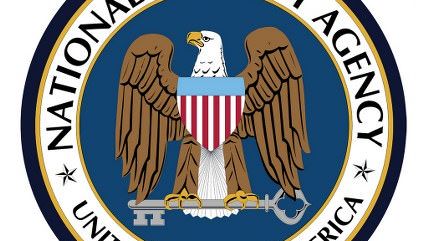Yes, the NSA Can Hoover Up Your Calls and Emails


Pundits with near-theological faith in the veracity of government officials have declared the NSA scandal to be overblown. Over at The Week, editor-at-large Marc Ambinder references a soothing statement from the Office of the Director of National Intelligence and declares, "[T]he upshot of the 2008 FISA amendments acts is that the NSA got expanded access to U.S. telecom switches and hubs in exchange for agreeing not to spy on Americans anywhere in the world without a FISA order. … Doesn't matter where you are: If you're an American, you're protected by FISA." But … That's not really what intelligence officials said. And Ambinder's conclusion doesn't follow.
The statement from the Office of the Director of National Intelligence reads in full:
The statement that a single analyst can eavesdrop on domestic communications without proper legal authorization is incorrect and was not briefed to Congress. Members have been briefed on the implementation of Section 702, that it targets foreigners located overseas for a valid foreign intelligence purpose, and that it cannot be used to target Americans anywhere in the world.
The key word here is "target." If the NSA follows the letter of the law (and it's far from the only agency engaged in snooping — I'm looking at you, FBI), it can't "target" Americans, but it can eavsdrop on their communications if they're participating in a conversation with a foreign "target." As the American Civil Liberties Union puts it:
Building off of statements like the one issued by Director of National Intelligence James Clapper—who said that the NSA can only target "non-U.S. persons located outside the United States"—officials have sought to give the demonstrably false impression that the government needs a warrant to read Americans' emails or listen to their phone calls under the FAA. …
But all of these defenses ignore a simple, basic point: Communication is a two-way street. And if an American is communicating (however innocently) with a foreign "target" under the FAA, the law allows the government to collect, inspect, and keep the content of that communication.
Even assuming that officials are being honest about their activities, the FISA Amendments Act of 2008 (PDF) is actually chock full of wiggle room. It authorizes the targeting of "persons reasonably believed to be located outside the United States," and insists that spying "may not intentionally target" Americans. "Reasonably" and "intentionally" are words that tend to have an enormous amount of elastic built into them. As the Washington Post reports, "Analysts who use the system from a Web portal at Fort Meade, Md., key in 'selectors,' or search terms, that are designed to produce at least 51 percent confidence in a target's 'foreignness.' That is not a very stringent test."
And that's without even getting into the ease (and openness) with which the NSA hands off surveillance it's clearly not authorized to conduct to agencies that have such authority.
So, the surveillance programs revealed in recent weeks are only "intentionally" targeting people "reasonably believed" to be foreigners with "at least 51 percent confidence." That's the extent of your protection against domestic spying.
Editor's Note: As of February 29, 2024, commenting privileges on reason.com posts are limited to Reason Plus subscribers. Past commenters are grandfathered in for a temporary period. Subscribe here to preserve your ability to comment. Your Reason Plus subscription also gives you an ad-free version of reason.com, along with full access to the digital edition and archives of Reason magazine. We request that comments be civil and on-topic. We do not moderate or assume any responsibility for comments, which are owned by the readers who post them. Comments do not represent the views of reason.com or Reason Foundation. We reserve the right to delete any comment and ban commenters for any reason at any time. Comments may only be edited within 5 minutes of posting. Report abuses.
Please to post comments


You know, at this point, I'm not sure how important it is what the law says. What's important is what the government is doing. It's clear that abuse of power and violation of law are commonplace. The question is, what are we going to do about it?
The question is, what are we going to do about it?
You just got yourself added to the watch list sir!
Freedom of speech except in cases of heresy.
Who cares? That constitution thingy was written over 200 years ago by a bunch of rich honkeys that had slaves and no longer applies to our progressive nanny state!
/sarc off (in case it is not blatantly obvious)
and those guys talked like fags
It's this or live under the threat of terrorism. Take your pick.
You know what's funny? We're under a far greater threat that an asteroid or comet will kill off a good portion of the human race. But compare the spending and the relative reduction in civil liberties between the War on Terror and the War on Asteroids/Comets.
But I say we have nothing to fear from the Comet Empire! It is the Gamilons that are the true threat!
Really, so long as we have giant, space-based lasers, pretty much any threat can be addressed.
Are there space sharks those lasers can be attached to? Makes the whole thing cooler in a Dr. Evil kind of way...
not as long as we have the Space Marines... and the Wave Motion gun.
I misread your comment at first and thought is said the Wave Lotion gun.
Pro Libertate| 6.20.13 @ 1:51PM |#
"You know what's funny? We're under a far greater threat that an asteroid or comet will kill off a good portion of the human race."
We're probably under a far greater threat of dying from an infected ingrown toenail, for pete's sake, but that doesn't stop the statists from making silly statements.
Coincidentally, giant, space-based lasers can address that problem, too.
I pick the threat of terrorism, since living in Panopticon will get increasingly oppressive. Since I'll die someday anyway, I'd like to be allowed to live freely until my time is up, either from natural causes or some 7th century religious nuttery.
At least one intelligence official has previously testified to Congress that our promulgated laws are there partially to deceive our opponents about our capabilities and intentions.
After that statement is made, no published law or testimony means anything whatsoever.
That being said, I think the wiggle room around "target" is even broader than Tuccille thinks it is.
I would not be surprised in the least if the purpose of the Verizon metadata is to establish a list of "participants" in a communication to several degrees of separation.
In other words, if the NSA's "target" is overseas, they may feel entitled to eavesdrop on persons in a communications chain with that target, and not just those in direct communications with that target. The metadata lets you quickly query for the set of persons who talked to anyone who talked to anyone who talked to the target. So the original target is used as the justification to eavesdrop on a vast number of people, who are not officially declared the "target" but whose communications are subject to surveillance anyway.
You can't get through the day without a good rationalization.
It's more important than sex.
+1 Goldblum.
That's standard intelligence analysis methodology. There's a web browser game by the same guy who is currently working on "Papers Please" that is based on this concept.
The Verizon metadata was regarding "business" accounts not private users. My guess is they were trying to track leaks from government contractors.
Unless you think it's rational that terrorist networks routinely operate inside Fortune 500 companies.
Nope. This seems to be a mistake that a number of sources have reported. The orders went to Verizon Business. Which happens to handle all of Verizon's call routing, not just the business ones.
Now that J.D. has learned how to actually spell Hoover, it's clear he's developed a severe vacuum fetish.
Great...now you have just lined up Sugarfree's next fic piece.
It's not my fault Dyson has ball technology.
I thought that was Bucky.
He needs to go to The Closet, as described in Zappa's Joe's Garage.
JD has been watching too much flatmate comedy.
If you're an American, you're protected by FISA.
You were off by just a century, Earl Browder.
FISA: Don't leave home without it.
Skype worked with PRISM in contravention of its stated privacy policy even before it was bought by Microsoft.
Seriously, just what information is out of bounds? Can I get a statement on that?
Any details about all the spying going on and what politically motivated usage they apply to that information.
That's a good question that I don't think has been brought up enough. We (H&R) crowd have talked a lot about how the regular warrant process should be sufficient. But when you justify open access to communications, isn't banking transactions and stock transactions and every other bit of electronically captured data subject to the same NSA oversight? What makes communications special?
Not to mention, what happens if all of this data isn't truly secure? There's this strange assumption that the government can keep all of this safe in some vault somewhere.
So, the surveillance programs revealed in recent weeks are only "intentionally" targeting people "reasonably believed" to be foreigners with "at least 51 percent confidence." That's the extent of your protection against domestic spying.
For a magazine called Reason, you are awfully afraid of the TOP MEN's reasonable belief that you are a terrorist.
Why do you not trust their secret, classified reasoning?
Well I'm not an American citizen and not currently in America, so clearly I have no privacy rights at all. After all when people were endowed by their creator with certain rights, the endowment was only to people living in the US. Outside of there God didn't care.
thanks for the information is very interesting and very useful Cara Pemesanan Ace Maxs, Obat Untuk Diabetes